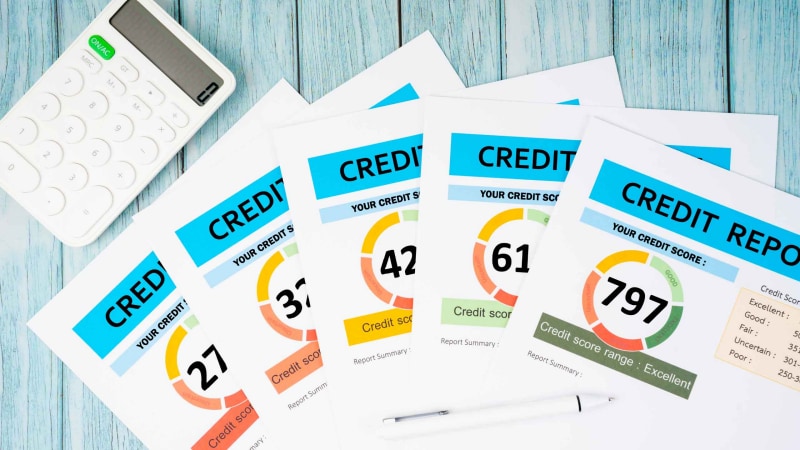What is a tri-merge credit report?

Quick insights
- A tri-merge credit report typically contains information about your credit from three credit bureaus.
- Having your credit information from different companies compiled into one report may be useful.
- Tri-merge credit reports may be used by lenders and creditors in their respective application review processes.
A tri-merge credit report, also known as a 3-in-1 credit report, is a comprehensive credit report that combines information from all three major credit bureaus in the United States: Experian™, Equifax® and TransUnion®.
Each credit bureau collects and maintains credit information on individuals and businesses, then organizes the data in the form of a credit report. The information each bureau maintains may differ. In a tri-merge credit report, however, credit information from all three major credit bureaus goes in one document.
In this article, we’ll review:
- What tri-merge credit reports are used for
- How tri-merge credit reports work
- How you can request a tri-merge credit report
What are tri-merge credit reports for?
Tri-merge credit reports are often used by businesses, lenders and financial institutions to assess credit applicants. Individuals may not always have a need for a tri-merge report unless they want to see a consolidated view of their credit history from all three bureaus. Nevertheless, if you've heard about tri-merge credit reports and want to know more, here are some ways they may be used.
Credit evaluations and risk assessment
Lenders and creditors may use a tri-merge report to evaluate an applicant's credit history when considering applications for loans, credit cards, mortgages or other forms of credit. The report provides a comprehensive view of the applicant's credit profile by combining data from all three major credit bureaus. The reason to use a tri-merge report is to help assess the level of risk associated with extending credit to a particular individual. The information in the report assists in determining the likelihood of the borrower repaying the debt as agreed.
Rental applications
Landlords and property management companies may request tri-merge credit reports when screening potential tenants. This could help them evaluate a tenant's financial responsibility and ability to pay rent on time.
Identity verification
Tri-merge credit reports are sometimes used to verify an individual’s identity. Lenders and other organizations may use the information in the report to confirm that the applicant is who they claim to be.
Employment screening
Some employers, especially those in financial and security-sensitive industries, may use credit reports as part of their background checks when hiring employees. A credit report can be used as one factor to assess an applicant's financial responsibility and integrity.
How do tri-merge credit reports work?
Tri-merge credit reports work by consolidating and presenting credit information from the three major credit bureaus into one comprehensive report. More specifically:
- Data is collected: Each of the three major credit bureaus collects and maintains credit data from various sources, such as lenders, creditors and public records. This data includes information about your credit accounts, payment history, outstanding debts and any negative items like late payments, collections or bankruptcies.
- Data is compiled: A specialized credit reporting agency or credit reporting service compiles data on an individual or business from all three credit bureaus. The compiled data are merged into a single report. For an individual, the compiled data would have personal information (name, address, Social Security number) and detailed credit information.
- Data is presented: The consolidated tri-merge report is presented in an organized format. Usually, this can make reviewing credit information, such as credit history, from all three credit bureaus easier. The report may include a summary of the individual's credit profile, an overview of credit accounts, payment history and more.
Although tri-merge reports provide a consolidated view of your credit history, the information may not always be identical across all three credit bureaus. Small variations in the data can occur due to differences in reporting practices and the timing of updates.
Can you request tri-merge credit reports?
Yes, you can request a tri-merge credit report, but not typically from a credit bureau. Instead, you could obtain a tri-merge report through services that specialize in compiling and providing comprehensive credit reports. Many of these services can be found online or may be recommended by financial advisors, and the cost for such a service can vary.
It's also worth noting that you are entitled to one free credit report from each of the three major credit bureaus once every 12 months through AnnualCreditReport.comOpens overlay. While this doesn't provide a tri-merge report, it allows you to obtain and review your individual reports from each bureau separately at no cost.
In conclusion
A tri-merge credit report provides a consolidated view of an individual’s or business’ credit history. Data from each credit bureau—including credit accounts, payment history, outstanding debts and any negative information—are compiled into a single report. Consumers can obtain their own tri-merge credit reports to monitor their credit profiles and check for errors or discrepancies. This is usually from a service independent of the credit bureaus, and the fees for such a service vary.
In general, monitoring your credit is important for maintaining a healthy credit history and addressing issues that may impact your financial well-being. And whether you want or need access to a tri-merge credit report, monitoring your credit can help form healthy financial habits.



